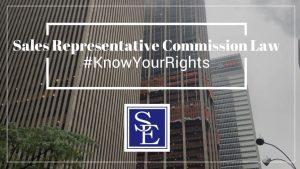Employers are increasingly attempting to avoid having to pay sales employees their rightfully earned and owed sales commissions during the COVID pandemic. In many cases, a company has no legal basis to avoid paying sales representatives their earned commissions by unilaterally retroactively changing the terms and conditions of how sales commissions are earned because COVID related conditions result in an unexpected increase in sales. In these situations, a sales representative understanding of their legal rights is critical if he or she has any hope in recovering their earned commissions.
Employees who are paid through commissions rightfully rely on being timely paid their earned compensation. Commission structures also benefit employers by motivating employees to perform at or above company expectations, thereby increasing profitability for the employer and allowing the employer to identify and reward its most productive employees. The type of commission structure an employer uses can range from simple to complicated, and most of them are memorialized in employment agreements signed by both emp loyer and employee. Once an employee and employer agree to the terms of how commissions are earned and when they are to be paid, an employer cannot unilaterally and retroactively change the terms without breaching the contract or potentially violating wage payment law. If an employer wishes to change the terms and conditions of a commission agreement, like any contract, they must give proper notice to the employee of the proposed change and obtain the employees clear consent to the new agreement. Often, employers who wish to alter commission structures do so to save money, which for the employee, means lower commissions and reduced income.
loyer and employee. Once an employee and employer agree to the terms of how commissions are earned and when they are to be paid, an employer cannot unilaterally and retroactively change the terms without breaching the contract or potentially violating wage payment law. If an employer wishes to change the terms and conditions of a commission agreement, like any contract, they must give proper notice to the employee of the proposed change and obtain the employees clear consent to the new agreement. Often, employers who wish to alter commission structures do so to save money, which for the employee, means lower commissions and reduced income.
Sometimes, an employer is prevented from paying agreed-upon commissions due to unpredictable hardships outside of the employer’s control, like acts of terrorism or natural disasters that make performance of the contract impossible or impracticable. For an employer to protect itself from these unforeseen events, they may contain a force majeure clause in a sales agreement which potentially could release the paying party from its obligations when payment becomes impossible or impracticable.
 New Jersey Employment Lawyers Blog
New Jersey Employment Lawyers Blog

